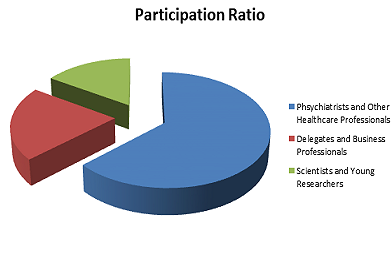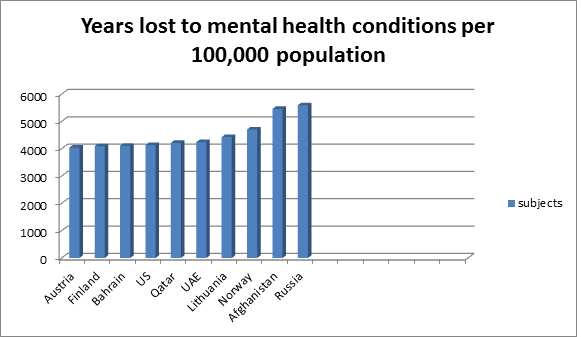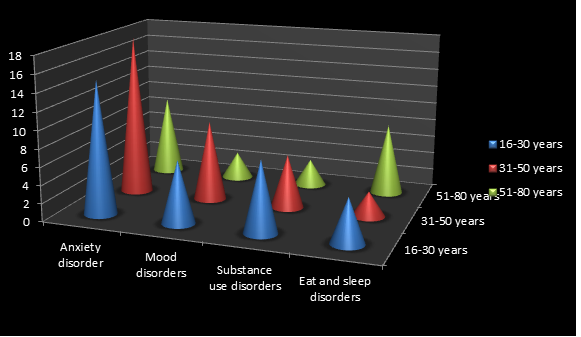Theme: Achieving Mental Wellness by understanding Human Mind
Psychiatry Meet 2019
ME conference takes colossal delight and feels regarded in welcoming the benefactors over the world to "31st International Conference on Psychiatry & Mental Health (Psychiatry Meet 2019)" to be held during October 24-25, 2019 | Helsinki, Finland. Our conference will be organized under the theme “Achieving mental wellness by understanding human mind."
Why to Attend?
International Conference on Psychiatry and Mental Health is to consign an extraordinary program for exchange of ideas and authoritative views by leading scientists which covers the entire spectrum of research in Psychiatric disorders and share the cross-cultural experiences of various treatment procedures. The central aim of this event is to spreading the current research, innovations, advance techniques and strategies which are applied in the field of Psychiatry and mental health.
Our conference brings national and International eminent personalities to a single floor and also provides a good opportunity for business. Our conference consist of symposium, workshops, lectures, YRF (Young Research Forum), poster presentation and various other programs for the participant over the globe.
Track 1: Psychiatry and Mental health
Psychiatry is the clinical strong point devoted to the analysis, prevention, have a look at, and remedy of mental problems. These consist of diverse maladaptations related to temper, behaviour, cognition, and perceptions. Mental health is a level of mental well-being, or a lack of intellectual illness. It is the psychological state of a person who's performing at a good level of emotional and behavioural adjustment .From the angle of positive psychology or holism, intellectual health may additionally consist of an individual's capacity to experience exist good things in life , and create a stability in life and efforts to gain mental resilience.
- Psychiatric genetics
- Psychiatric epidemiology
- Psycho-oncology
- Mental well-being and mental illness
- Cultural and religious considerations
Track 2: Adolescent Psychiatry
Adolescent Psychiatry is the department that focuses in, prognosis, remedy and prevention of thinking, feeling and/or behaviour affecting kids, young people and their families. The adolescent psychiatrist uses the knowledge of biological, mental, and social factors in working with patients. The psychiatrist makes a diagnosis primarily based at the pattern of conduct and emotional signs, the use of a standardized set of diagnostic standards along with the Diagnostic and Statistical Manual or the International Classification of Diseases.
- Geriatric psychiatric
- Electroconvulsive therapy
- Psychoactive drugs – uses and Over-prescription effects
- Factors influenced-Biological and Genetical
Track 3: Cortical Development in Psychiatry
In Psychiatry and mental wellness Cortical advancement is an accumulation of human cortical gray matter change between the age of 4– 21 years utilizing quantitative 4D maps and time-lapse by groupings. Thirteen energizing children for whom anatomic personality MRI examines were gotten for like clockwork, and for 8– 10 years it had been contemplated. With the assistance of models of the cortical surface and sulcus regional marks, human cortical change may be imagined over the age assortment. The outcome shows that ,higher-arrange alliance cortices develop best after lower-arrange somatosensory and visual cortices, the abilities of which they join, are developed, and afterward phylogenetically more established personality districts develop ahead of time than more moderen ones. Coordinate diverge from customary cortical improvement may moreover help for the learning of some neurodevelopmental issue comprising of youth-beginning schizophrenia or a mental imbalance.
- Schizophrenia Analysis based on Imaging
- Brain and Behavior Development in Autism
- Cortical Thinning and Neuropsychiatric Outcomes in Children
Track 4: Biomarkers in Psychiatry
Biomarker is an indicator of normal biological process and biological response to a therapeutic intervention. Biomarkers in biological research principles, patterns, and process have provided acute information on the pathogenesis of various psychiatric disorders. In recent studies the 8 brain imaging procedures (advanced functional/ neurochemical /structural imaging techniques) in Alzheimer's disease are considered as potential biomarkers. The rank of biomarkers in important psychiatric disorder autism is yet to be known. The clinically adaptable biomarkers is yet to be identified in the favourable leads for potential biomarkers that involve parameters of oxidative stress, mitochondrial function, immune system or certain gene clusters.
Track 5: Forensic Child and Adolescent Psychiatry
Forensic child and adult psychiatry is an challenging field which correlate the interaction between two important fields. Forensic psychiatry and the areas of knowledge and expertise that are the purview of the child psychiatrist: child custody, child abuse and child neglect, and the juvenile court.
Forensic psychiatry comes under one of the subfield of psychiatry and is related to criminology. It encircles the interface between law and psychiatry. A forensic psychiatrist provides services such as determination of competency to stand trial to a court of law to facilitate the adjudicative process and provide treatment like medications and psychotherapy to criminals.
- Violence Risk Management
- Treatment and assessment conflict
- Criminological Models
Track 6: Psychiatry Disorders or Psychological Syndrome
A psychiatric disorder is otherwise called as mental illness diagnosed by a mental health professional that enormously disturbs your thinking, moods, behavior and badly increases your risk of disability, pain, death, or loss of freedom.
- Mind-body problem
- Mood disorders
- Anxiety disorders
- Sleep and eating disorders
- Psychotic disorders
- Developmental disorders
- Disorders of attention and behavior
Track 7: Abnormal and Developmental Psychology
Developmental psychology and abnormal psychology, both are different significant fields of psychology and which are more popular from the lot. Developmental psychology deals with the mental, cognitive, and psychological changes that occur during a human’s life cycle. Whereas abnormal psychology deals with the scientific study of irregular occurrences of human thought, emotion and behavior.
- Modern psychoanalysis
- MRI study of children with developmental disorder
- Analysis of Factors
- Nutritional approaches for mental health
Track 8: Psychosis-Medication, Counseling and Early Intervention
Psychosis is a condition of mind where it could not differentiate what is real and what is not. People with Psychosis may believe or sense things that aren’t real like hearing voices that no other can hear and seeing things that no other can see and become confused or slow in their thinking. Most of the people think of psychosis as a break with reality.
- Hallucinations
- Delusion
- Disorganization
Track 9: Industrial and Organizational Psychology
Industrial and Organizational Psychology is otherwise known as occupational psychology or organizational psychology. It is the science of human behaviour relating to work and applies psychological theories and principles to organizations and individuals in their places of work as well as the individual's work-life
- Occupational stress
- Problems Addressing
- Population Served Solutions
- Skills and Procedures Utilization
Track 10: Women Mental Health and Illness
Hormone changes that occur during a woman's menstrual cycle and pregnancy period may play a important role in their mental health. There are many environmental factors are there which may spoil the mental health of a woman like harassment, rape cases and post trauma practices. But most of the woman meets with the mental illness in their pregnancy and menstrual cycle period.
- Premenstrual dysphoric disorder (PMDD)
- Postnatal depression and perinatal mental health
Track 11: Neuro Psychology, Neuro Pharmacology and Neuro Chemistry
Neuropsychology is the study about the structure and function of the brain and their specific psychological processes and behaviours. It aims to understand how behavior and cognition are influenced by brain functioning and is concerned with the diagnosis and treatment of behavioral and cognitive effects of neurological disorders. Here classical neurology deals with information about physiology of the nervous system and classical psychology deals with mind and its behavioural characteristics. So that Neuropsychology tends to discover how the brain correlates with the mind. It thus shares concepts and concerns with neuropsychiatry .l. The term neuropsychology normally stands for lesion studies in humans and animals with respect to the recordings of electrical activity from individual cells or groups of cells.
Neuropharmacology gives data about how sedates influence the sensory system, and the neural mechanisms through which they induce conduct. The two noteworthy branches of neuropharmacology are behavioral and molecular. Behavioral neuropharmacology centers around the investigation of how drugs influence human behaviour, including the investigation of how medicate reliance and addiction influence the human mind.
- Biological psychiatry
- Mind/brain monism
- Causal pluralism
- Neurochemical interactions
- Behavioral & Molecular neuropharmacology
- Psychoactive drug and neurotransmitters
Track 12: Social Neuroscience- Neuroimaging and Neuroplasticity
Social neuroscience is a research field which relates how social processes and behaviors are implemented by the biological system using biological concepts and methods to inform and refine theories of social processes and behavior.
Neuroplasticity is the ability of the brain to change or adapt itself throughout an individual's life. It may results in the change of proportion of grey matter, and synaptic alterations. Advanced brain imaging technologies are used to investigate neuroplasticity in relation to recovery and treatment of neurologic injury and disease.
- Mind reading using neuro imaging
- Functional imaging in Psychiatry
- Brain Training
Track 13: The Impact of Mental Illness on Society
The shattering consequence of mental health disorder can be seen in all levels of society. Issues of mental unsteadiness are caused by psychological mutilation or psychiatric disorders. Anyone who is inclined to mental impairments can encounter chronic mental health disease or episodic bouts of the disorder. Stress or other environmental triggers can throw a healthy person into a mental health crisis or cause a recovering person to relapse.
The individuals with mental illness whorl out of control, the family steps in as caregivers, which places the burden onto the family. The family structure undergoes huge change in order to meet the need of the loved one who is ill. The struggle to handle and provide help for their loved one often creates mal-adaptive behaviors among family members. This type of strain results in family instability, and family members becomes susceptible to the very mental problems they are trying to solve.
- Economic impact
- Panic Attacks
- Self & Environmental harmness
- Suicidal Thoughts
Track 14: Mental Health and Rehabilitation
Mental Health Rehabilitation is the process of restoration of community functioning and well-being of an individual who are in mentally inconvenient state or affected by mental disorders.
The aim of Rehabilitation is to manage their illness so that they can be successful and satisfied and participate in the community while maintaining an increased level of independence and a high level of quality of life.
- Social Psychiatry
- Peer-provider approach
- supported employment
- Recovery Process
Track 15: Advanced Therapeutics for Mental Health Disorders
Mental illness covers a huge variety of disorders, from schizophrenia, depression, Alzheimer's, anxiety and self-harm to eating disorders. Psychotherapy is often used either alone or in blend with medications to treat mental illnesses. These days extraordinary advances have been made in the treatment of mental illness. Treatment methods for psychiatric disorders can be categorized as somatic and psychotherapeutic. We will be discussing about somatic treatments including drugs, electro convulsive therapy, and deep brain stimulation such as Transcranial magnetic stimulation therapy on psychotherapeutic treatments and as well as mindfulness-based therapies.
- Innovations in Electroconvulsive Therapy
- Botulinum toxin: an emerging therapeutic towards treatment of depression
- Transcranial magnetic stimulation therapy
- Implementation of mindfulness-based therapies
- Herbal medicine in psychiatry
- Yoga for mental health training
Track 16: Research work and Case studies on Psychiatry and Mental Health
In comparison with many other medical disorders, psychiatric disorders are poorly understood and better treatments are needed. These disorders can be the outcome of many different kinds of experiences in a person's life, from early childhood to later life events. So there is a need for research in psychiatry because of the scale of mental health problems, the challenges of an ageing population and age-associated psychiatric disorders and the fact that, Rehabilitation is really necessary in psychiatry.
- Ethical Issues in Mental Health Research
- Population Based Study
- Risks and Benefits
- Post-Trial Obligations
Related Associations:
American Psychiatric Association, American Academy of Psychoanalysis and Dynamic Psychiatry (AAPDP), Arab Federation of Psychiatrists (AFP), Mental Healthcare Organization of Uganda (MHOU), World Association for Dynamic Psychiatry (WADP),Society of Neurology, Psychiatry & Neurosurgery, International Society for Psychological and Social Approaches to Psychosis (ISPS), Association of Professional Counseling Psychologists, American Academy of Child and Adolescent Psychiatry, International Stress and Behavior Society, National Institute of Mental Health.
Summary:
Psychiatry is the branch of medicine that is concerned with the study, treatment, and prevention of mental illness, using both medical and psychological therapies. Psychiatry includes various levels of mental state conditions starting from neuropsychiatry to general psychiatric conditions. Psychiatry meetings try to focus on all these mental conditions.
Mental health includes our emotional, psychological, and social well-being. It helps us to determine how we handle stress and make choices. It is important at every stage of life, from childhood & adolescence till adulthood. Mental health may include an individual's ability to enjoy life, and create a balance between life activities and efforts to achieve psychological resilience.
International Conference on Psychiatry and Mental Health is to consign an extraordinary program for exchange of ideas and authoritative views by leading scientists which covers the entire spectrum of research in Psychiatric disorders and share the cross-cultural experiences of various treatment procedures. The central aim of this event is to spreading the current research, innovations, advance techniques and strategies which are applied in the field of Psychiatry and mental health.
Scope and Importance:
One in four individual in the globe will be affected by mental disorders at some point in their lives. About 450 million people currently suffer from such conditions, placing mental disorders among the leading causes of ill health worldwide. Treatments are available, but nearly two-thirds of people with a known mental disorder never seek out help from a professional. Stigma, discrimination and neglect prevent care and treatment from reaching people with mental disorders, says the World Health Organization (WHO). Where there is neglect, there is little or no understanding. Where there is no understanding, there is neglect. So it is really necessary to have a brush up on this topic.
Target Audience:
- Psychiatrists
- Physicians
- Psychologists
- Specialists
- Researchers
- Health care professionals
- Professors
- Industrial Experts
- Neuropsychiatrists
- Mental health Nurses
- Lecturers and Students from Academia
- Psychiatry Scientists/Research Professor
- Physicists/Chemists
- Junior/Senior research fellows of Psychology Field/ Clinical Psychology Field/ Nursing Science/ Health Care
- Hospitals and Health Services
- Heads, Deans and Professors of Psychiatry Departments
- Members of different Psychiatry associations

Top universities globally working in the field of Psychiatry & Mental Health
- University of Cambridge
- UCL
- KCL
- University of Edinburgh
- University of Manchester
- Cardiff University
- University of Vermont
- University of Amsterdam
- Ghent University
- Maastricht University
- University of Melbourne
- University of Queensland
- University of New South Wales
- University of Adelaide
- University of Sydney
- Australian National University
- Monash University
- Macquarie University
- University of Hong Kong
- University of British Columbia
- Dalhousie University
- Mount St. Vincent University
- St. Mary's University
Countries which have most impact on Mental Health:
Although mental health affects many people around the world, there is often not adequate provision for those suffering from it
In countries such as Tajikistan and Ghana, mental health spending is lower than $2 (£1.30) per capita compared with $330 in Sweden.
However, it is not just about spending. Figures released by WHO show that many of the countries most affected by mental health are not among the world’s poorest.

The graph shown below clearly shows the percentage of people who suffer from different mental disorders in each age groups.
Anxiety disorders happen when a person has severe dread or fear of a situation, the situation depends on the type of anxiety disorder the person has.
Affective disorders are otherwise known as mood disorders - Bipolar disorder, depression, OCD, PTSD schizoaffective disorders and more.
Substance use disorders- when people experience severe changes in their behaviour due to use or overuse of some substances

PSYCHOTIC DISORDERS
Degrees of improvement of schizophrenia from CBT
Cognitive-behavioral therapy (CBT) has been shown to be efficacious in reducing symptoms of chronic, stable schizophrenia, but with a small effect size. A meta-analysis of 33 studies with a total of 1142 participants with schizophrenia and positive symptoms reported response rates to CBT by degree of improvement [10]. On average, 44.5 percent of patients reached a 20 percent (minimally improved) reduction of overall symptoms, and 13.2 percent reached a 50 percent (much improved) reduction. Minimal and much improvement in positive symptoms were seen in 52.9 and 24.8 percent of patients, respectively. For individuals who experience persistent delusions or hallucinations despite adequate trials of antipsychotic medication, we continue to recommend adjunctive treatment with cognitive-behavioral therapy over medication alone.
Conference Highlights
- Psychiatry and Mental health
- Adolescent Psychiatry
- Cortical Development in Psychiatry
- Forensic Child and Adolescent Psychiatry
- Psychiatry Disorders or Psychological Syndrome
- Abnormal and Developmental Psychology
- Psychosis-Medication, Counseling and Early Intervention
- Industrial and Organizational Psychology
- Women Mental Health and Illness
- Neuro Psychology, Neuro Pharmacology and Neuro Chemistry
- Social Neuroscience- Neuroimaging and Neuroplasticity
- The Impact of Mental Illness on Society
- Mental Health and Rehabilitation
- Advanced Therapeutics for Mental Health Disorders
- Research work and Case studies on Psychiatry and Mental Health
- Biomarkers in Psychiatry
To share your views and research, please click here to register for the Conference.
To Collaborate Scientific Professionals around the World
| Conference Date | October 24-25, 2019 | ||
| Sponsors & Exhibitors |
|
||
| Speaker Opportunity Closed | |||
| Poster Opportunity Closed | Click Here to View | ||
Useful Links
Special Issues
All accepted abstracts will be published in respective Our International Journals.
- Journal of Psychiatry
- International Journal of Emergency Mental Health and Human Resilience
- Journal of Child and Adolescent Behavior
Abstracts will be provided with Digital Object Identifier by









